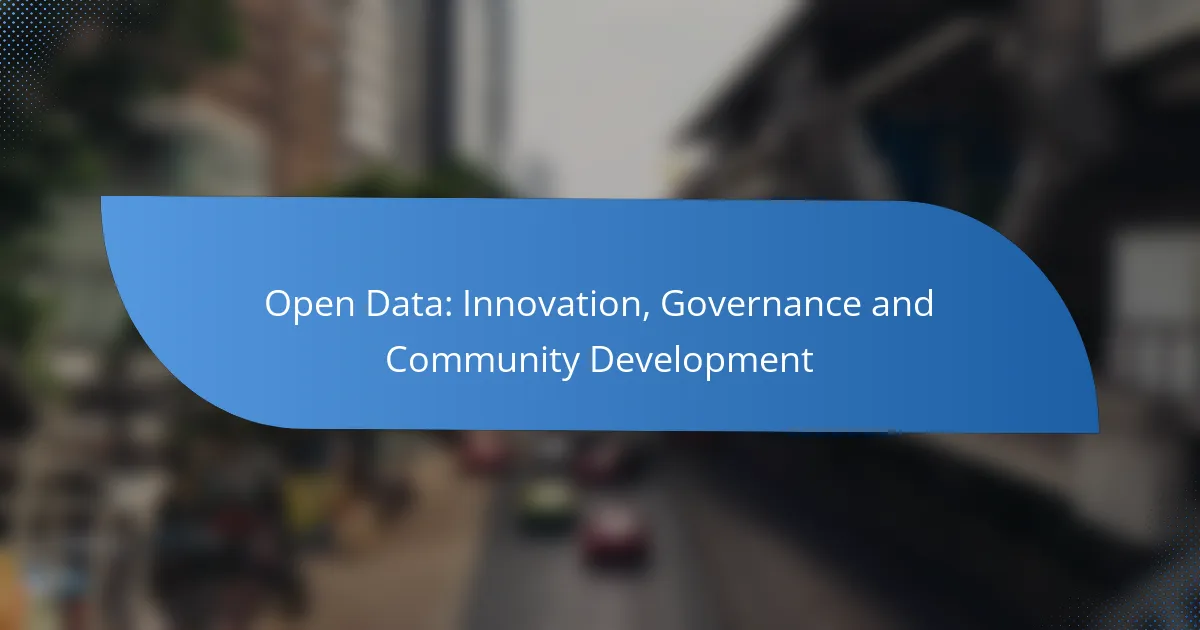Open data serves as a catalyst for innovation and community development by making information readily available for creative problem-solving and informed decision-making. By fostering transparency and collaboration among citizens, businesses, and governments, open data enhances governance models and promotes effective resource management. Through the strategic use of accessible datasets, communities can identify needs, allocate resources efficiently, and drive impactful solutions that improve quality of life.
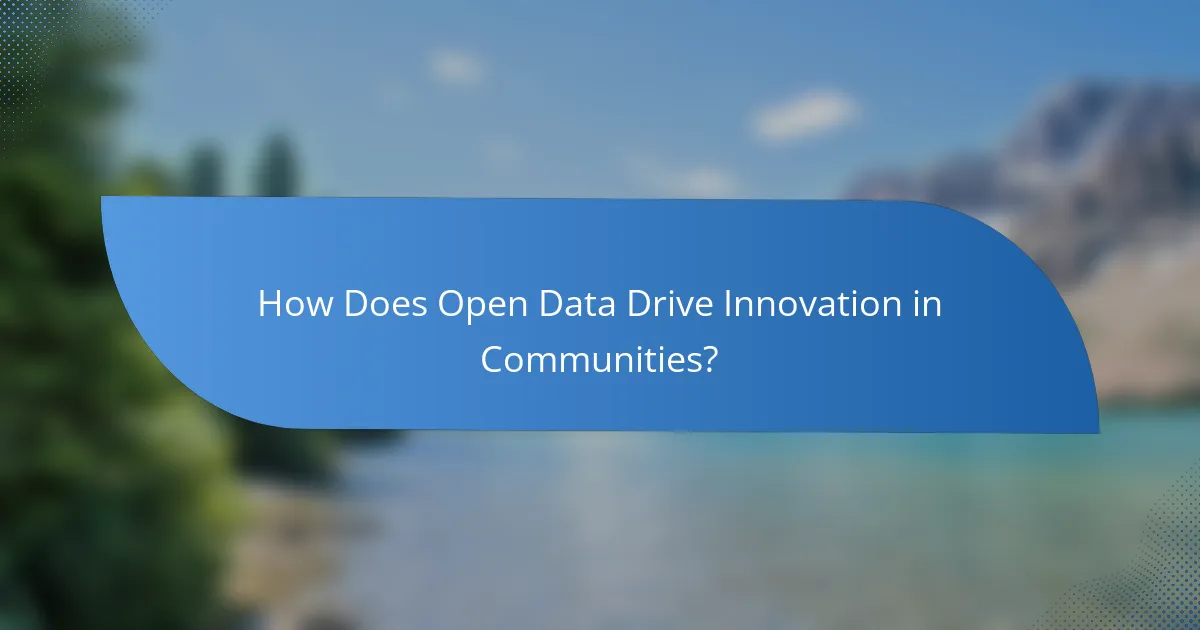
How Does Open Data Drive Innovation in Communities?
Open data drives innovation in communities by providing accessible information that can be leveraged for creative solutions and informed decision-making. This transparency fosters collaboration among citizens, businesses, and governments, leading to improved services and enhanced quality of life.
Case studies of successful innovation
Numerous communities have successfully utilized open data to spark innovation. For instance, the city of New York launched its Open Data Portal, allowing developers to create applications that improve public services, such as real-time transit updates. Similarly, the city of Barcelona has used open data to enhance urban planning and citizen engagement, resulting in more responsive governance.
Impact on local economies
Open data can significantly impact local economies by enabling businesses to make data-driven decisions. Access to information about demographics, traffic patterns, and local resources allows entrepreneurs to identify market opportunities and optimize their operations. Cities that embrace open data often see increased investment and job creation, contributing to overall economic growth.
Examples of innovative projects
Innovative projects leveraging open data include platforms that visualize crime statistics to improve public safety and applications that track environmental quality in real-time. For example, the “Data-Driven Detroit” initiative uses open data to analyze urban challenges and develop solutions that enhance community well-being. Such projects not only address local issues but also inspire similar initiatives in other regions.
Partnerships fostering innovation
Partnerships between government agencies, private companies, and non-profits are crucial for fostering innovation through open data. Collaborative efforts, such as hackathons and data challenges, encourage diverse stakeholders to come together and brainstorm solutions. These partnerships can lead to the development of new technologies and services that benefit the community, making open data a catalyst for collective progress.
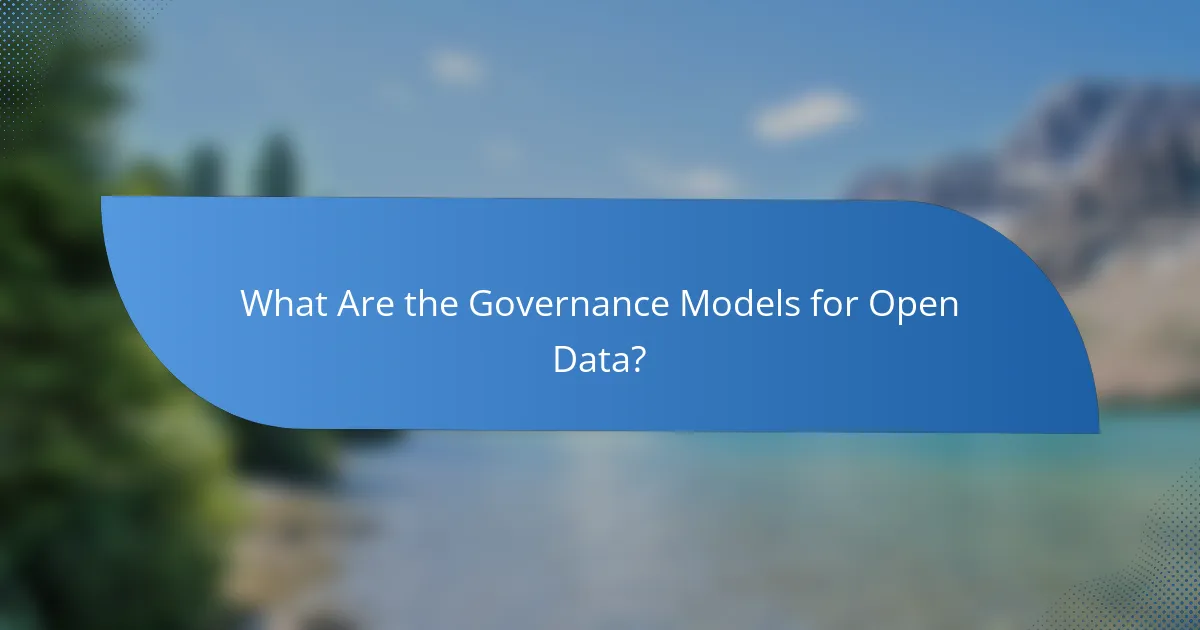
What Are the Governance Models for Open Data?
Governance models for open data define how data is managed, shared, and utilized within a community or organization. These frameworks ensure transparency, accountability, and effective use of data resources, promoting innovation and community development.
Best practices in data governance
Effective data governance involves establishing clear policies, roles, and responsibilities for data management. Best practices include creating a data governance committee, developing data quality standards, and ensuring compliance with relevant regulations such as GDPR in Europe or CCPA in California.
Regular training and awareness programs for stakeholders enhance understanding and adherence to governance policies. Additionally, implementing a feedback mechanism allows for continuous improvement of data governance practices.
Examples of effective governance frameworks
One notable example is the Open Government Partnership, which encourages countries to adopt open data policies that enhance transparency and citizen engagement. Frameworks like the Data Governance Framework from the World Economic Forum provide guidelines for establishing robust governance structures.
Local governments, such as those in the UK, have implemented the Local Government Transparency Code, mandating the publication of specific datasets to promote accountability and public participation. These frameworks often include metrics for assessing data quality and usage.
Role of government in open data
Governments play a crucial role in promoting open data by establishing policies that encourage data sharing and accessibility. They can create platforms for data publication and provide funding for data initiatives that foster innovation and community development.
Moreover, governments can collaborate with private sectors and civil society to enhance data literacy and usage. By setting standards and ensuring compliance, they help build trust in open data initiatives, which is essential for their success.
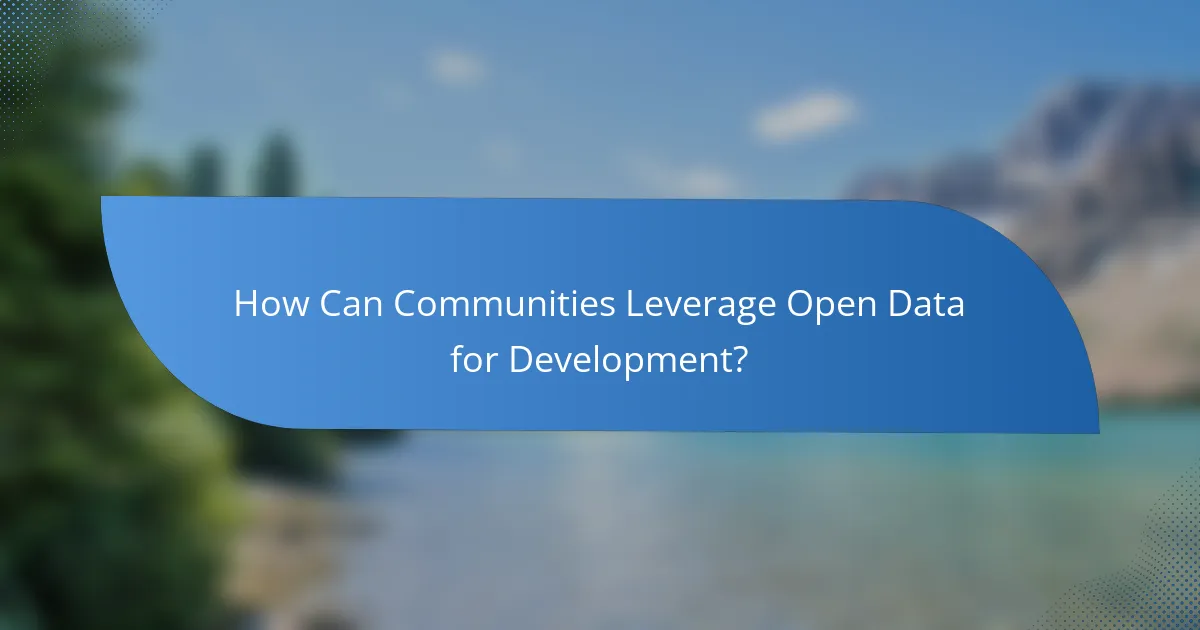
How Can Communities Leverage Open Data for Development?
Communities can leverage open data for development by utilizing accessible datasets to inform decision-making, enhance transparency, and foster collaboration. By engaging local stakeholders and employing data analysis tools, communities can identify needs, allocate resources effectively, and drive innovative solutions.
Community engagement strategies
Effective community engagement strategies involve actively involving residents in the data collection and analysis process. Organizing workshops, public meetings, and online forums can help gather diverse perspectives and ensure that the data reflects the community’s needs.
Utilizing social media platforms and community newsletters can also enhance outreach and participation. Encouraging feedback and collaboration fosters a sense of ownership, which is crucial for the success of open data initiatives.
Tools for data analysis
Communities can use various tools for data analysis, ranging from simple spreadsheet software to more advanced platforms like Tableau or R. These tools help visualize data trends, making it easier for stakeholders to understand and act on the information.
Open-source tools like OpenRefine and Google Data Studio are particularly beneficial for communities with limited budgets. They allow users to clean, analyze, and share data without incurring significant costs.
Success stories from community initiatives
Many communities have successfully leveraged open data to drive development. For instance, a city in the United States used open data to improve public transportation routes based on commuter feedback, resulting in increased ridership and satisfaction.
Another example is a European town that utilized open data to track local air quality, leading to community-led initiatives aimed at reducing pollution. These success stories highlight the potential of open data to empower communities and create positive change.
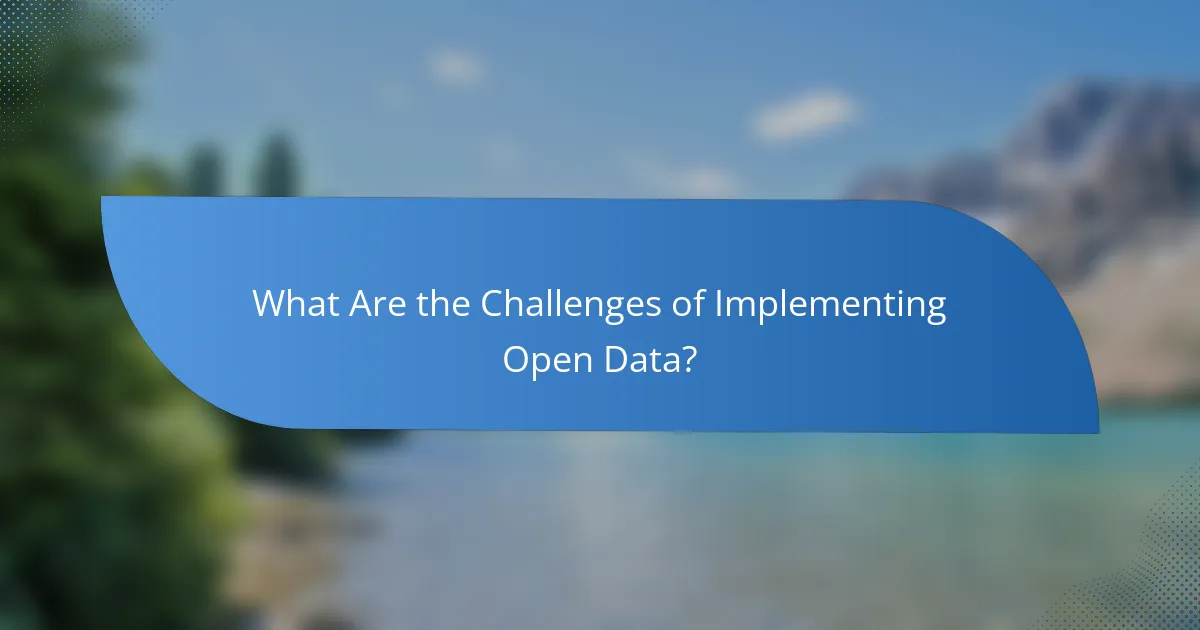
What Are the Challenges of Implementing Open Data?
Implementing open data faces several significant challenges that can hinder its effectiveness and accessibility. Key issues include data privacy concerns, technical barriers to access, and funding and resource limitations.
Data privacy concerns
Data privacy is a primary challenge in open data initiatives, as releasing certain datasets can expose sensitive information about individuals or organizations. Governments and organizations must ensure that data is anonymized or aggregated to protect personal privacy while still providing valuable insights.
Compliance with regulations such as the General Data Protection Regulation (GDPR) in Europe adds complexity, as entities must navigate legal requirements to avoid potential fines. Establishing clear guidelines for data sharing and usage is essential to mitigate these risks.
Technical barriers to access
Technical barriers can impede the effective use of open data, particularly for those without advanced skills or resources. Many datasets are not formatted for easy access, requiring users to have specific software or technical know-how to analyze the information.
Additionally, inconsistent data quality and lack of standardization can lead to confusion and misinterpretation. Providing user-friendly platforms and tools can help bridge this gap, making data more accessible to a broader audience.
Funding and resource limitations
Funding and resource limitations are significant hurdles for many organizations looking to implement open data initiatives. Developing and maintaining open data platforms often requires substantial financial investment in technology, personnel, and ongoing support.
Smaller organizations or local governments may struggle to allocate sufficient resources, leading to underdeveloped projects. Seeking partnerships with academic institutions or private sector entities can provide additional support and expertise to enhance open data efforts.
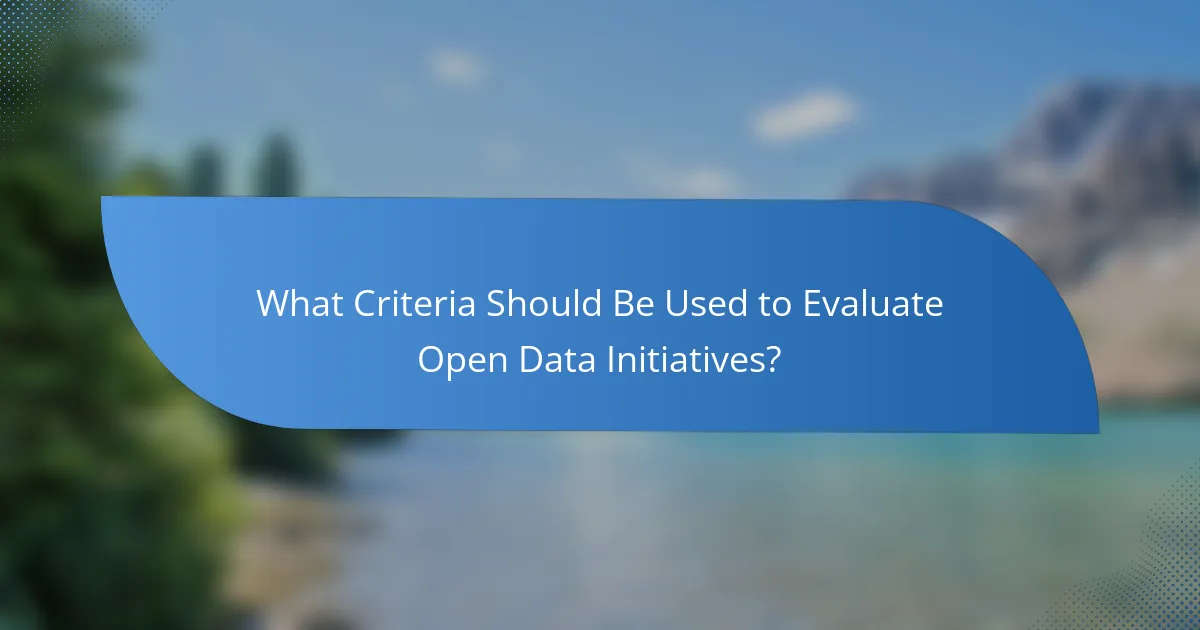
What Criteria Should Be Used to Evaluate Open Data Initiatives?
Evaluating open data initiatives requires a clear set of criteria to assess their effectiveness and impact. Key factors include data quality, accessibility, user engagement, and the initiative’s alignment with community needs.
Metrics for success
Success metrics for open data initiatives can vary, but they typically focus on data usage, user satisfaction, and tangible outcomes. Common metrics include the number of downloads, API calls, and user feedback ratings.
For instance, an initiative may track how many times data sets are accessed or how often they are used in applications. Additionally, measuring the impact on decision-making or policy changes can provide insights into the initiative’s effectiveness.
To ensure comprehensive evaluation, consider using a combination of qualitative and quantitative metrics. Regularly review these metrics to adapt strategies and improve the initiative based on community feedback and changing needs.
